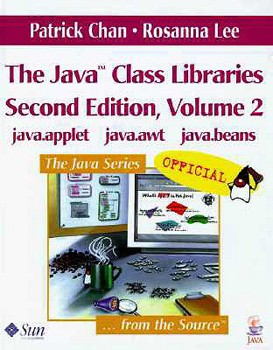The Java(tm) Class Libraries, Volume 2: Java.Applet, Java.AWT, Java.Beans
Select Format
Select Condition 
Book Overview
Thousands of expert Java developers rely on The Java(TM) Developers Almanac for the fast answers they need to save time -- and the authoritative guidance they need to build great applications.... This description may be from another edition of this product.
Format:Hardcover
Language:English
ISBN:0201310031
ISBN13:9780201310030
Release Date:January 1997
Publisher:Addison-Wesley Professional
Length:1712 Pages
Weight:6.10 lbs.
Dimensions:2.1" x 7.8" x 9.6"
Customer Reviews
5 ratings
Much better and faster then browsing the online material
Published by Thriftbooks.com User , 23 years ago
1) See the title .. All info you ever need about API structure, classes, details .. in your hand and not in 100 IE bookmarks.2) I have to deal with class files on the bytecodes level and didn't expect this book to be much useful for me - suprise !!! It has an excellent table "Class File Format" ( I had to built one such for myself long time ago ) and some others regarding bytecodes issues - very nice and comfortable. It's only ~5 hours I own this book but already pulled it 5 times from the shelf. So, it's not a question of "buy or not" - buy !3) We all enjoyed reading this in preface : "There was a time, not long ago, when I intimately knew all of the Java class libraries .. ( of course, it helped me that I was on of the original developers :-) But aside from the occasional inability to remember which argument of Vector.insertElementAt() is the index, I rarely had to refer to any reference documentation .." Thank you, Patrick !
Powerful examples
Published by Thriftbooks.com User , 24 years ago
Whereas the first volume concentrated on the normal data manip & movement classes required for normal, quick programming, this second volume is more about controlling the user interfaces through applets and multimedia manipulation.The examples are very useful; some introduce basic game techniques such as "double-buffering" to demonstrate nontrivial applications of the classes. The descriptions at the beginning of each class/interface (and in the intro) are carefully written and informative. Meaty.(If you're wondering what double-buffering is, it's just the practice of drawing an image in a buffer of memory, then copying the buffer to the screen's memory. Cuts down on flicker, since it's not taking time thinking while putting things directly to screen.)
Just what I was looking for -- great reference
Published by Thriftbooks.com User , 25 years ago
As a beginning Java Programmer, I was looking for a reference for all the java packages. This book contains all objects which changed since the JDK 1.1. I continue to use it daily. The one dissapointment I had, was my own missunderstanding of the nature of the book. As the title implies this is a supplement, if you want a complete reference you must buy the vol 1 and 2 of the java reference. The index in this book will refer you to the other volumns for an object which did not change in 1.2. The organization is well thought out and the coding examples are helpful to me as a beginner. The completeness and index make this a superb reference manual.
Complete resource for class names and interfaces
Published by Thriftbooks.com User , 25 years ago
Given the large size of the current class libraries in Java, the quality of your references is now more critical than ever. In my work as a technical editor of Java books, I have found this book invaluable. The content consists almost entirely of the class names, what they are derived from and the interfaces. The remainder is a collection of "examplets", small snippets of code that show how some of the methods are used. Alphabetized based on the class names, it is adequate when your only interest is in the name of a class or the characteristics of a method. Of course, it is only my first avenue, for more detailed information it is necessary to consult another resource. However, in many of those instances, consulting this book first saved time in examining the other documentation. Covering versions, 1.0, 1.1 and 1.2 of the JDK, this is one shelf reference that you should not be without. I listed it as one of the best books of the year in my On Books column that appeared in the September,1999 issue of Journal of Object-Oriented Programming.
Other books are nice, but this one is necessary.
Published by Thriftbooks.com User , 25 years ago
This book (and the Volume 1 companion) are required for any Java programming. Every class, field and method is covered in detail. Novices will need other material (like the online tutorial) for language syntax, and how to program. But all Java programmers need these books within arms reach.





